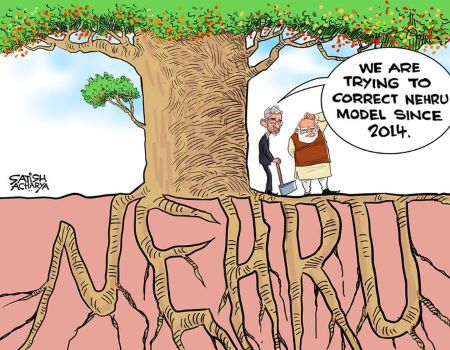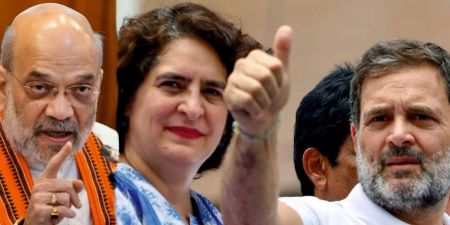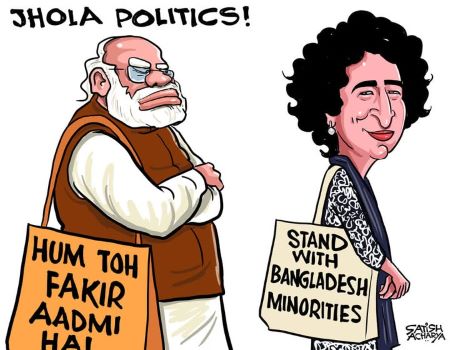How political parties’ accusations often reflect their own contradictions, fueling bitterness and eroding democratic dialogue
POLITICAL RHETORIC and bitterness between the ruling party and opposition parties are worsening by the day, with each side seizing every opportunity to take potshots and ridicule their opponents. This often leads to ironic and self-contradictory situations.

Gone are the days when Parliament was a venue for enlightened speeches and friendly repartee between political opponents, free from any bitterness. Stalwarts like Piloo Mody, known for his legendary sense of humour, Ram Manohar Lohia, and Jawaharlal Nehru exchanged jibes but without any trace of hostility. Points were made loud and clear, with interruptions being rare. Leaders frequently met outside Parliament, sharing meals and discussing topical issues.
In contrast, today’s political scenario is marked by a lack of respect and a pervasive bitterness. Stalling Parliamentary proceedings has become routine, although this is not a new phenomenon—BJP members engaged in similar behaviour during the UPA rule. Communication has broken down, and leaders seldom meet informally across party lines.
 Ironically, political parties fail to recognize their own hypocrisy when criticizing their opponents.
Ironically, political parties fail to recognize their own hypocrisy when criticizing their opponents.
For instance, the Congress, which has a controversial history of constitutional violations, has been accusing the BJP of attempting to amend the Constitution.
Its leaders, including Rahul Gandhi, have toured the country with copies of the Constitution, alleging that the BJP seeks to subvert it. Priyanka Gandhi and other Congress leaders have echoed these accusations, extending their campaign even to the Maharashtra assembly elections, where the issue had little resonance.
The Congress’s attempts to position itself as the saviour of the Constitution conveniently overlook its own record. It was Indira Gandhi who imposed the Emergency, stripping citizens of their fundamental rights.

Additionally, Congress-led central governments frequently dismissed opposition-ruled state governments at will. Ironically, the current BJP government could be criticized for the opposite—its reluctance to dismiss its own party’s government in Manipur, led by Biren Singh, despite a clear case for doing so.
On the other hand, BJP leaders have accused the Congress of being divisive, particularly over the issue of caste census. Prime Minister Narendra Modi recently claimed that the Congress is trying to divide the Other Backward Classes (OBCs) for political gains by fragmenting their unified identity.
Modi alleged that the party seeks to weaken the OBC community’s influence through such measures. Similarly, Union Home Minister Amit Shah accused the Congress of wanting to breach the 50% reservation ceiling to introduce religion-based quotas.

Accusing the Congress of divisiveness is particularly ironic, given the BJP’s own track record. The BJP has embedded a Hindu-Muslim narrative into its campaigns, fostering mutual suspicion and injecting communal tensions into society. While it accuses the Congress of pandering to minorities at the expense of the majority, it actively leverages divisive rhetoric for electoral gains.
These are classic examples of the pot calling the kettle black. It is high time political leaders restrained themselves from making unsubstantiated allegations to score brownie points. Instead, they should focus on improving mutual communication by meeting informally and discussing issues constructively. ![]()
_________
Also Read:
A Bitter Battle
Is democracy working for India?
Disclaimer : PunjabTodayNews.com and other platforms of the Punjab Today group strive to include views and opinions from across the entire spectrum, but by no means do we agree with everything we publish. Our efforts and editorial choices consistently underscore our authors’ right to the freedom of speech. However, it should be clear to all readers that individual authors are responsible for the information, ideas or opinions in their articles, and very often, these do not reflect the views of PunjabTodayNews.com or other platforms of the group. Punjab Today does not assume any responsibility or liability for the views of authors whose work appears here.
Punjab Today believes in serious, engaging, narrative journalism at a time when mainstream media houses seem to have given up on long-form writing and news television has blurred or altogether erased the lines between news and slapstick entertainment. We at Punjab Today believe that readers such as yourself appreciate cerebral journalism, and would like you to hold us against the best international industry standards. Brickbats are welcome even more than bouquets, though an occasional pat on the back is always encouraging. Good journalism can be a lifeline in these uncertain times worldwide. You can support us in myriad ways. To begin with, by spreading word about us and forwarding this reportage. Stay engaged.
— Team PT

